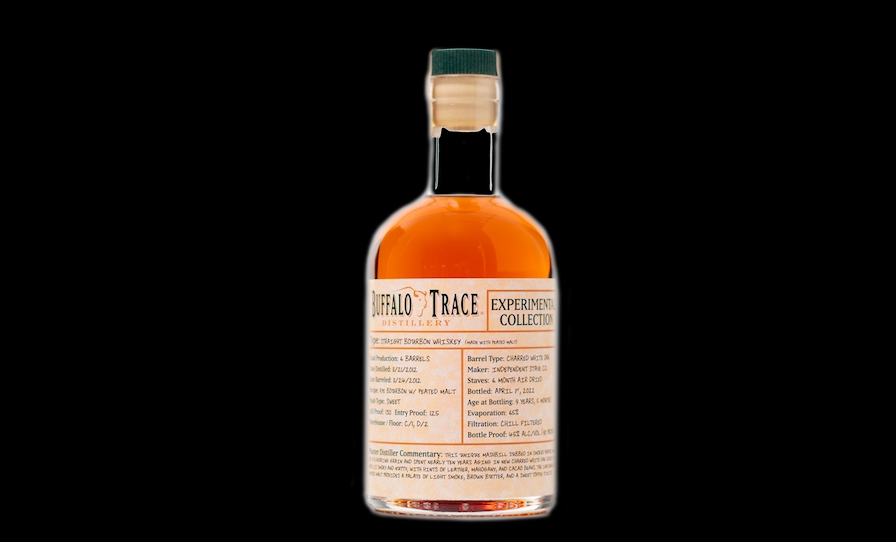Buffalo Trace is one of the most beloved distilleries in America. It’s also one of the most award-winning. Iconic names like Colonel E.H. Taylor, Blanton’s, Elmer T. Lee, Stagg, and Pappy Van Winkle all help that love (and hype) spread throughout the whiskey-drinking world. But as with any distillery worth its salt, there’s so much more than big names and awards to BT. Master Distiller Harlen Wheatley has been tinkering with an Experimental Collection of spirits for years now and he just dropped a brand new one.
Below, I’ll be reviewing the 26th edition of Wheatley’s Experimental Collection — a peated bourbon. Peated whiskey is traditionally a very Scottish thing but people have been playing around with peated malted barley in bourbon a little bit recently. Kings County Distillery and J. Riddle both have peated bourbons and even WhistlePig is getting in on the smoke game with their SmokeStock Whiskey.
Still, this is a very niche style of bourbon that’s in its infancy. That makes it fascinating to try. Check my review below.
Buffalo Trace Experimental Collection Straight Bourbon Whiskey Made With Peated Malt

ABV: 45%
Average Price: $46 (.375ml bottle or half bottle)
The Whiskey:
This whiskey is made from an experimental mash bill of high-rye bourbon that replaces the classic malted barley with peated malted barley. That’s barley that’s kilned (dried to stop germination) with peat as a heat source, which imbues smoke (phenols if you want to get all sciencey about it) into the barley grains. The whiskey was distilled and barreled back in November 2012 in only six barrels. Those barrels were stored on low floors of warehouses C and D for 10 years. Over that time, 65% of that whiskey evaporated.
Finally, the whiskey was batched and proofed down before bottling before a run through a chill filter.
Tasting Notes:
Nose: The nose opens with a mild sense of old cigar smoke in a leathery old library with a layer of vanilla pods, dark chocolate-covered marzipan, and rich and butter toffee next to deeply stewed stone fruits with a dash of woody spice.
Palate: The palate is silken and lush with a sense of gomme syrup (it’s almost velvety) that gives way to brown butter vanilla malt over salted toffee and smoky campfire burnt marshmallow with a faint whisper of smoked prune and cherry.
Finish: The end leans into the campfire smokiness as the vanilla, fruit, and marzipan fade out, leaving you with a sense of burnt sugars and vanilla tobacco pouches next to a lingering sense of burning sage, cinnamon bark, and allspice leaves that just inch into ashy bitterness.
Bottom Line:
The end of this really starts getting ashy and that can be a big turn-off for some people. I dig it in that it takes classic Kentucky bourbon and adds a whole new dimension in a subtle way that gently builds to boldness. The profile eases you into the peated smokiness.
Still, this is a really unique bourbon and feels like you really need a baseline to enjoy it. If you already dig the peat monsters of Islay and the sugar bombs of Kentucky, then this is so going to be your jam. If you’re coming in cold, this could be a very hard experience to get your head around.
Ranking:
88/100 — this is a solid B+. Overall, I enjoyed it but it also feels like there’s more to draw from this idea — it deserves further exploration.
Availability:
This is a whole hornet’s nest of an issue. This is highly allocated. Even the press release states that it’ll be available in “extremely limited quantities.” That means that the likelihood of you finding this at MSRP and not marked up to the hilt is “extremely” low to nil. Right now, retailers, bars, and restaurants are receiving their allocation. My best advice is to hit your favorite and best whiskey bar to see if they snagged one and try it there. Otherwise, you’re going to have to be a very good customer of a very good liquor store to score one of these.
And if that’s not the case, you’re going to have to pay a lot to buy one (think anything from $500 to $1,000 per bottle).







